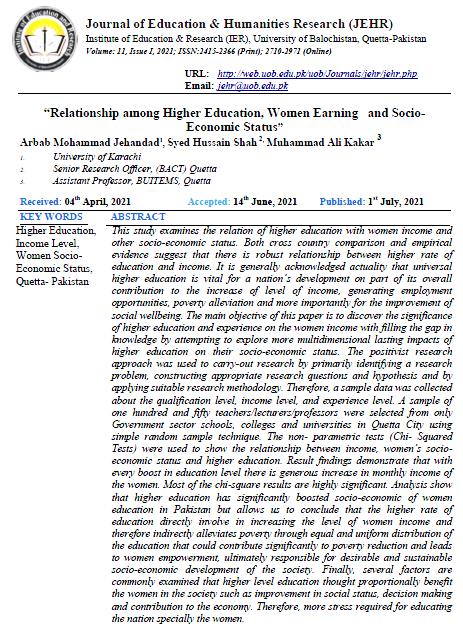The relationship between Higher Education, Women Earning and Socio- Economic Status, Quetta- Pakistan
Abstract
This study examines the relation of higher education with women income and other socio-economic status. Both cross country comparison and empirical evidence suggest that there is robust relationship between higher rate of education and income. It is a generally acknowledged fact that universal higher education is vital for a country’s development on the part of its overall contribution to the increase of level of income, generating employment opportunities, poverty alleviation and more importantly for the improvement of social wellbeing. The main objective of this paper is to discover the significant of higher education and experience on the women income with filling the gap in knowledge by attempting to explore more multidimensional lasting impacts of higher education on their socio-economic status. .The positivist research approach was used to conduct research by initially identifying a research problem, constructing appropriates research questions and hypothesis and by applying suitable research methodology. Therefore, a sample data was collected about the qualification level, income level, and experience level. A sample of one hundred and fifty teachers/lecturers/professors were selected from only Government sector schools, colleges and universities in Quetta City using simple random sample technique. The non- parametric tests (Chi- Squared Tests) were used to show the relationship between income, women’s socio-economic status and higher education. Our result findings demonstrate that with every increase in the education level there is a substantial increase in the monthly income of the women. Most of the chi-square results are highly significant. Our analysis shows that higher education has significantly boosted socio-economic of women in Pakistan but allows us to conclude that the higher rate of education directly involve in increasing the level of women income and therefore indirectly to alleviate poverty through equal and uniform distribution of the education that could contribute significantly to poverty reduction and leads to women empowerment ultimately responsible for desirable and sustainable socio-economic development. Finally, we examine several factors commonly that higher level education thought to proportionally benefit the women in the society such as improvement in social status, decision making and contribution to the economy.
References
Mamoni Kalita & Aviral Kumar Tiwari (2011), The state of Indian housewives’ participation in domestic decision making and opposition of domestic violence Malaysia Journal of Society and Space 7 issue 4 (9 - 15) .
Mahamud Reza(2007), Household Decision Making and Education of Women in Bangladesh- Secondary data analysis of Bangladesh Demographic and Health Survey, Uppsala University, Uppsala, Sweden.
Sarfraz and Rizwan (2011),Effects of Women Education and Marriage Period on Their Decision Making Power at Household Level in Gujrat- Pakistan.Middle-East Journal of Scientific Research 4.Rummana,(2007), Impact Of Higher Education On Earnings Of Women In The Public Sector Educational Institutions In Pakistan, International Business & Economics Research Journal
Batool, A (2002) Socio Religions Determinants of women status: A case study in rural areas of district Faisalabad. M.Sc. Thesis, Department of Rural Sociology, University of Agriculture, Faisalabad–Pakistan Volume 6, Number 11.
Becker, Gary S.(1993), Human Capital, New York: Columbia University Press. 3rd Edition.
Becker, Gary S. (1962) Investment in Human Capital: a Theoretical Analysis. Journal of Political Economy 70, Supplement.
Blomqvist, Ake (1986)Higher Education and the Markets for Educated Labour in LDCs: Theoretical Approaches and Implications The Pakistan Development Review 25(3): 249-270.
Botelho, Anabela and Ligia Costa Pinto (2004) Student’s expectations of the economic returns to college education; results of a controlled experiment. Economics of Education Review (23) p 645-653.
Horowitz, John B. and Lee Spector (2005) Is there a difference between private and public education on college performance? Economics of Education Review 24 p.189-195.
Johnstone, D. Bruce (2004). The economics and politics of cost sharing in higher education: comparative perspectives. Economics of Education Review 23 p. 403-410.
Khan, Akhter Hassan (1997) Education in Pakistan : Fifty Years of Neglect The Pakistan Development Review 36(4) PartII :647-667
Khan S.R. and M.Irfan (1985). Rate of Return to Education and Determinants of Earnings in Pakistan. The Pakistan Development Review,34:3 and 4
Kruijk, Hans de and Frank Van Tongeren (1988) Growth, Employment and Education: An Application of Multicriteria Analysis to Pakistan. The Pakistan Development Review 27 (4) Part II 725-735
Machlup, Fritz (1982) Issues in the theory of Human Capital. Education as Investment, The Pakistan Development Review, 21(1):1-14
Meir, Gerald M. (1984) Leading Issues in Economic Development: oxford University Press
Mincer, Jacob(1974) Schooling, Experience and Earnings: New York : National Bureau of Economic Research
Nasir,Z.M. and Hina Nazli (2000) Education and Earnings in Pakistan, Pakistan Institute of Development Economics, Islamabad. (Research Report No 177)
Ranis, Gustav and Francis Stewart (1997) Growth and Human Development: Pakistan in Comparative Perspective The Pakistan Development Review 36(4) Part I: 333-352
Schultz, Theodore W. (1961) Investment in Human Capital, The American Economic Review vo1.LI.
Schultz, Theodore W. (1975) The Value of the Ability to deal with Disequilibria, Journal of economic Literature. Vol:8
Shabbir, Tayyab (1991), Sheepskin effect in the Return to Education in a Developing country, The Pakistan Development Review 30(1):1-19
Sylwester, Kevin (2002), Can education expenditures reduce income inequality? Economics of Education Review 21 p. 43-52




